Special Report
12 Easy Recipes to Feed Your Family While You’re Sheltering in Place
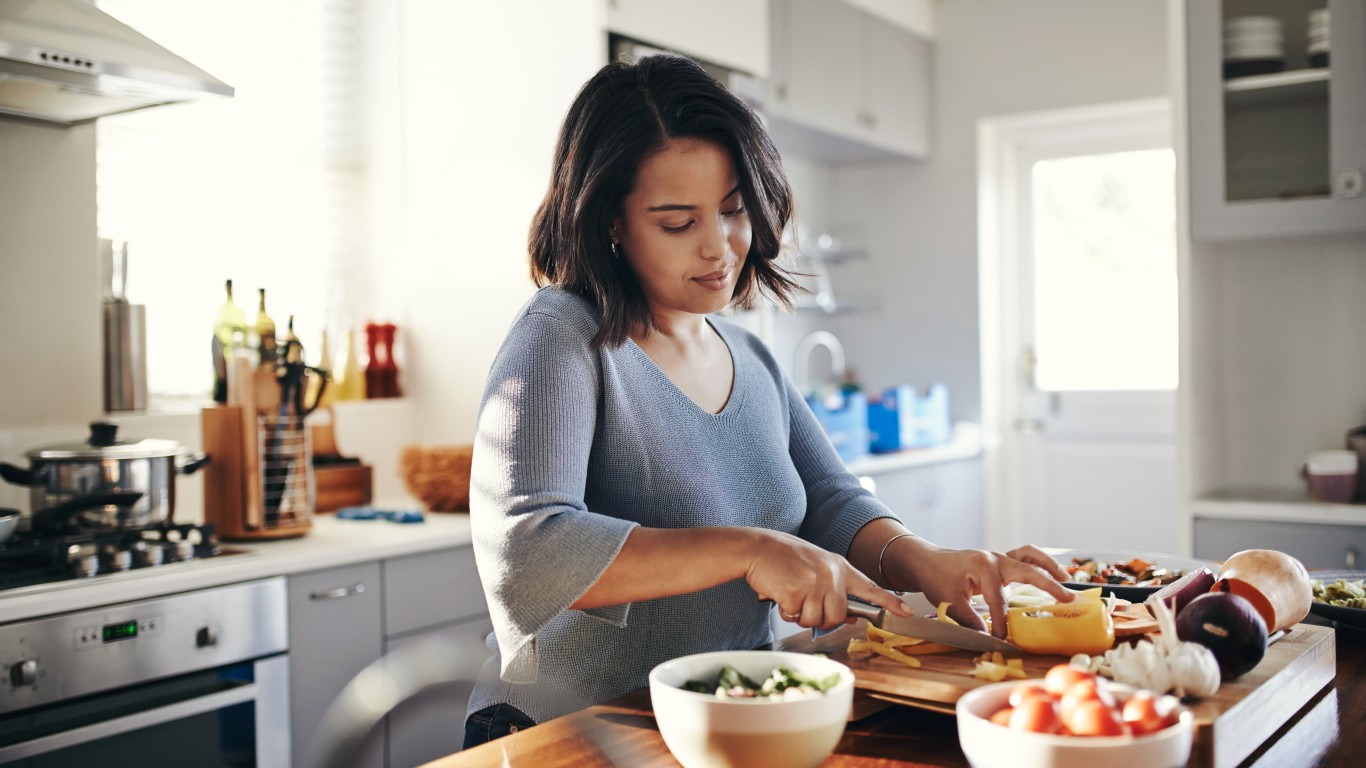
Published:

The coronavirus pandemic has wreaked both economic and emotional havoc on our nation. By now, we all know the basics (wash your hands frequently, keep at least six feet away from others, avoid touching your face, etc.). But the toughest recommendation to follow for many is “Stay at home if you can” — to quote the Red Cross’s web page “Coronavirus: Safety Tips for You.”
Following this directive — in some cases (as in California) mandated by state governments, in others strongly counseled by health officials or a matter of personal choice — has forced the closing not only of offices and factories but of theaters, sports stadiums, parks and beaches, retail stores, and of course bars and restaurants.
Some restaurateurs have found ways to stay partially open by offering food for takeout and delivery — even pricey Michelin-starred establishments. (Here are 18 fancy restaurants offering takeout and delivery during the coronavirus crisis.)
But for many people, what sticking around the house to avoid COVID-19 means — besides watching Netflix and other streaming services and TV channels — is the chance to do a lot of home cooking.
Recipes and kitchen tips keyed to the current situation are being offered by a wide range of publications, as well as by online cooking courses and Facebook pages like Quarantine Cuisine.
24/7 Tempo has pitched in by offering suggestions for quick dishes to prepare when you have less than an hour to cook.
Here are some more detailed suggestions — a dozen recipes that sometimes take a bit of time (even overnight marinating), but that will satisfy hungry family members and fill the house with tempting cooking aromas. All recipes serve 4, with one exception, noted below.
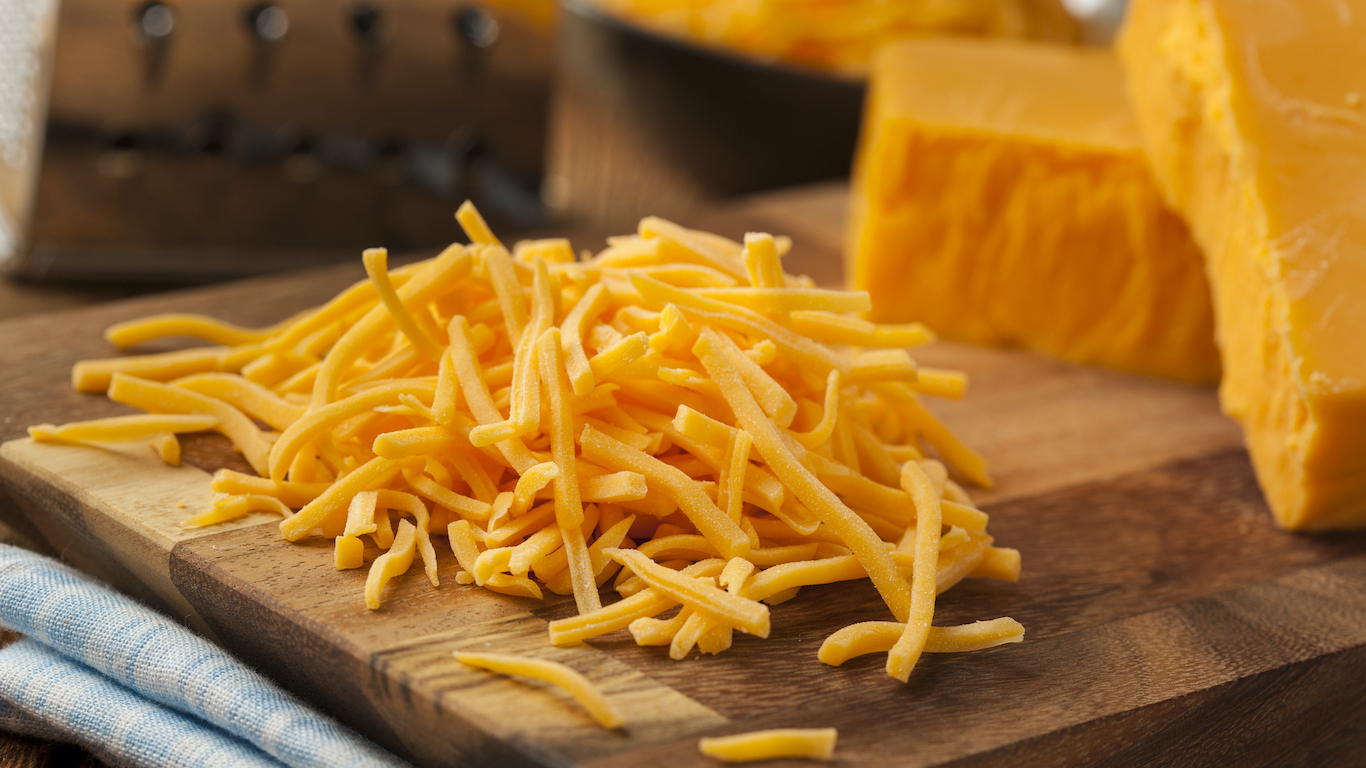
Golden cheese soup (ingredients)
Cheddar and muenster make a good combination in this soup, but you can use just one or the other, or substitute gouda, fontina, or Monterey jack — also shredded, and at room temperature — for one or both.
1/2 stick butter
I small onion or two large shallots, peeled and finely chopped
1 small stalk celery, finely chopped
1 small carrot, shredded
1/4 cup flour
2 cups whole milk
2 cups chicken stock
1 cup shredded yellow cheddar at room temperature
1 cup shredded muenster at room temperature
Salt and white pepper
[in-text-ad]
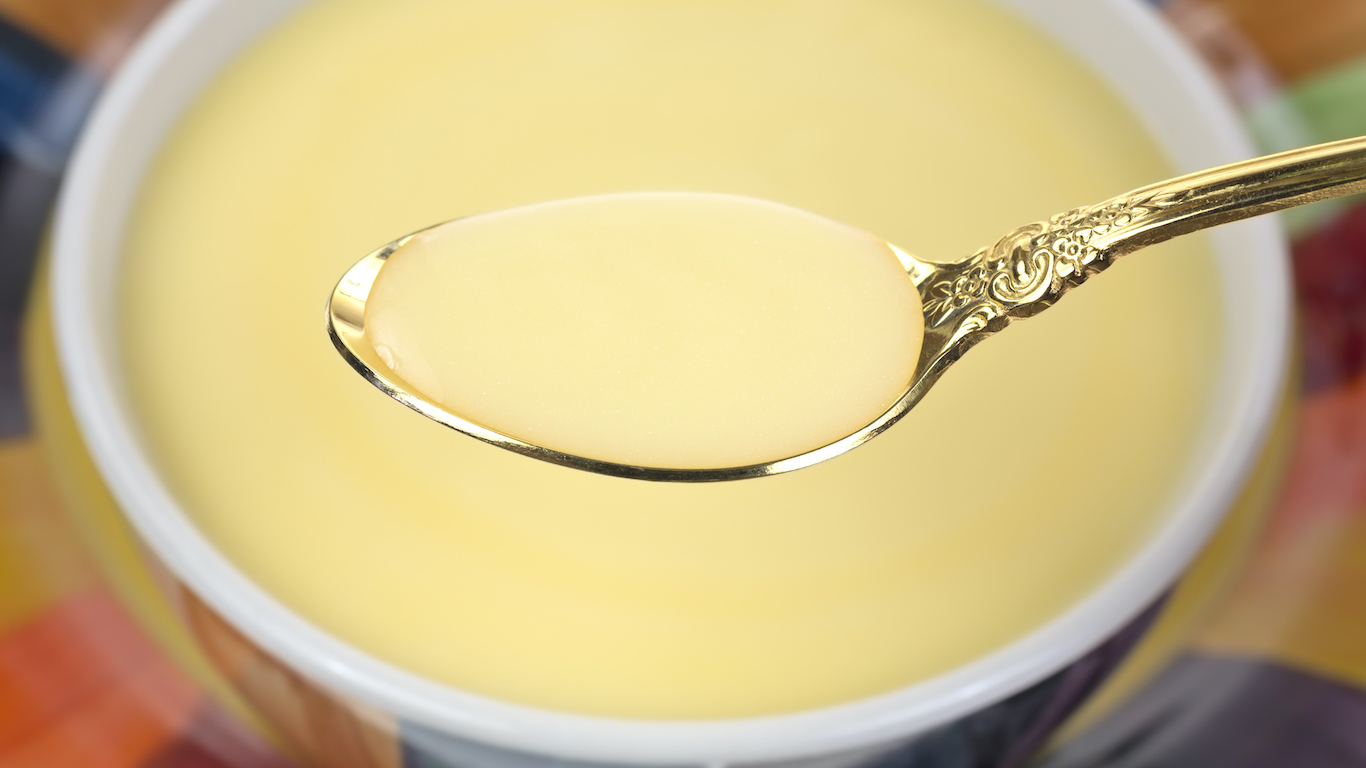
Golden cheese soup (directions)
Melt butter in a large skillet over low heat, then add onions or shallots and celery and cook, stirring occasionally, for about 15 minutes, or until onions are soft and translucent. Add carrots and cook about 5 minutes more, then sprinkle in flour and stir well.
Add milk in a slow stream, stirring constantly. Raise heat to medium and continue cooking, stirring constantly, for 2-3 minutes or until mixture thickens. Transfer mixture to a blender or food processor and process until smooth, then return to the skillet. Stir in stock, then scatter in cheeses, stirring constantly. Cook until just melted, then immediately remove from heat and season to taste with salt and pepper. Serve with crackers or “better than garlic bread” (see below)
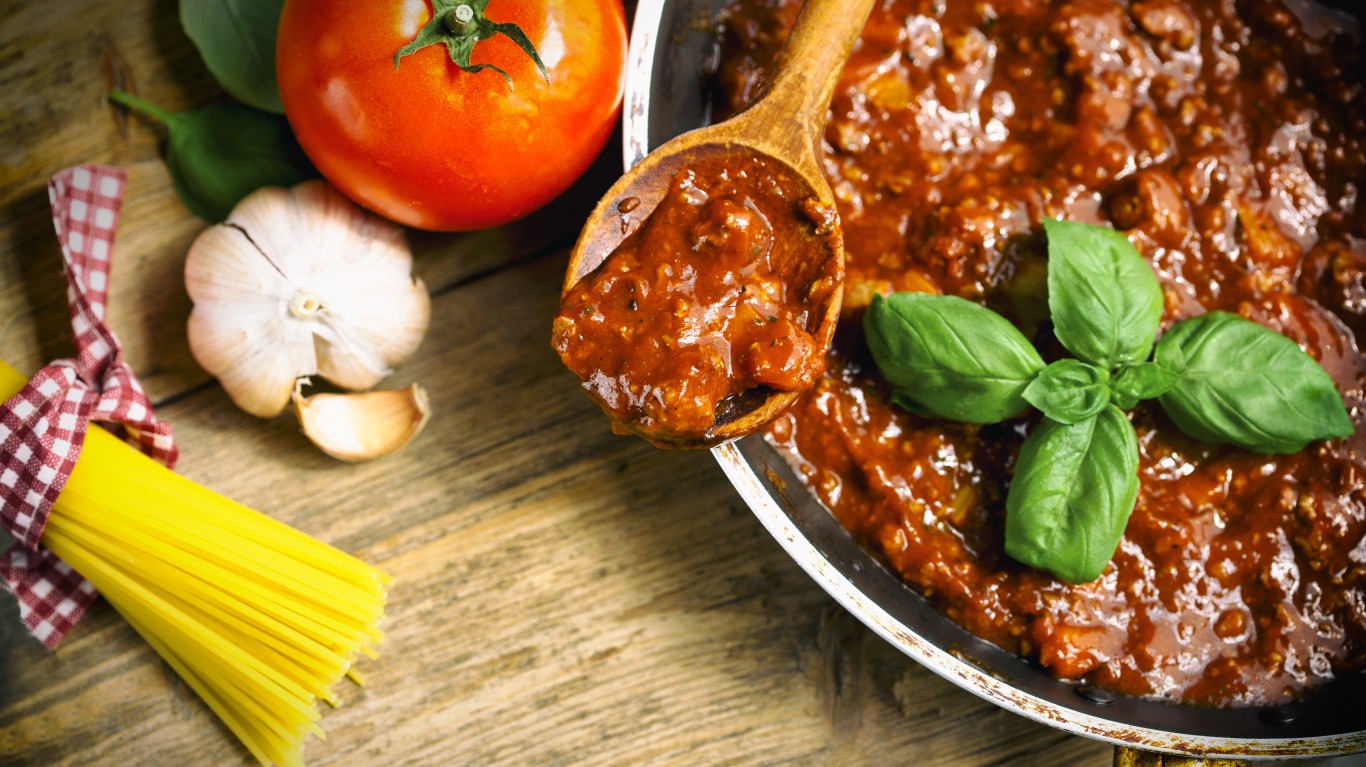
Pasta with meat sauce (ingredients)
This simple, all-purpose meat sauce goes well on any shape of pasta, but is particularly good with short shapes like penne, ziti, or farfalle (bow ties), or with gnocchi.
2 tbsp. extra-virgin olive oil
1 medium onion, peeled and chopped
1/2 pound ground pork
1/2 pound ground veal
Salt and pepper
2 cups tomato sauce, homemade or store-bought (such as Prego or Ragù)
1 lb. dried or fresh pasta or gnocchi
Grated parmesan cheese for garnish
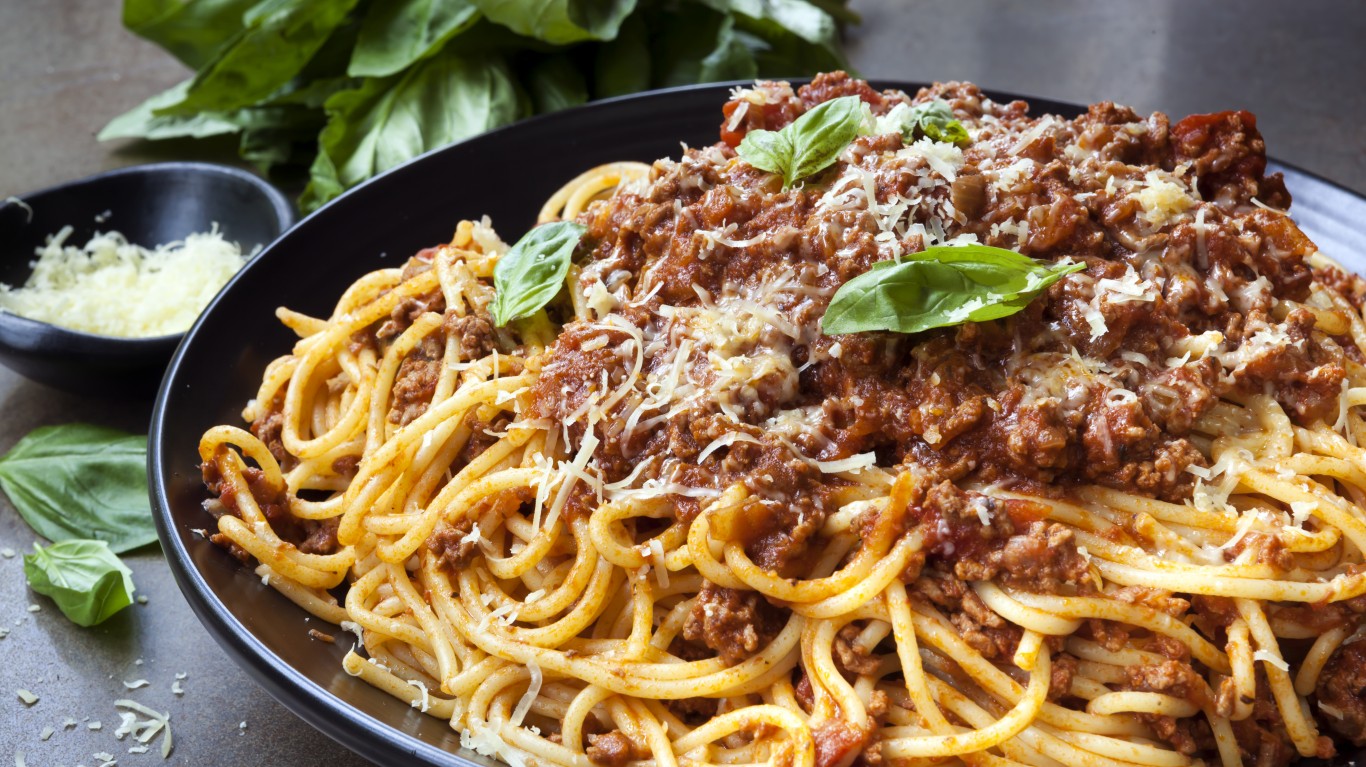
Pasta with meat sauce (directions)
Heat the oil in a large skillet over medium heat, then add onion, pork, and veal, stirring ingredients together and breaking up meat with a wooden spoon. Season generously with salt and pepper. Cook for about 20 minutes, or until onions are very soft and meat is browned, stirring frequently.
Drain meat and onion in a colander, then return it to skillet and add tomato sauce. Reduce heat to low and simmer for about 20 minutes more.
While the sauce simmers, bring a large pot of salted water to a boil over high heat. Add the pasta or gnocchi and cook until done to your taste, approximately 10-12 minutes for dried pasta, 3-4 minutes for fresh pasta, 1-2 minutes for gnocchi (or until they rise to the surface).
Drain the pasta in a colander and transfer to a large bowl. Stir in the sauce. Sprinkle parmesan cheese over the top of the pasta and serve with more parmesan on the side. Serve with “better than garlic bread” (see below), if you like.
[in-text-ad-2]
Better than garlic bread (ingredients)
Fresh herbs are usually preferably to the dried variety, but this is one recipe where the dried ones work better. If you like, you may substitute or add 1/4 tsp. dried rosemary and/or 1 tsp. dried marjoram or summer savory.
1 long loaf sourdough bread, unsliced
1/2 tsp. garlic powder
1/4 tsp. dried thyme
1/4 tsp. dried basil
1 tsp. each dried oregano, onion flakes, parsley, and chives
2 sticks salted butter, softened to room temperature
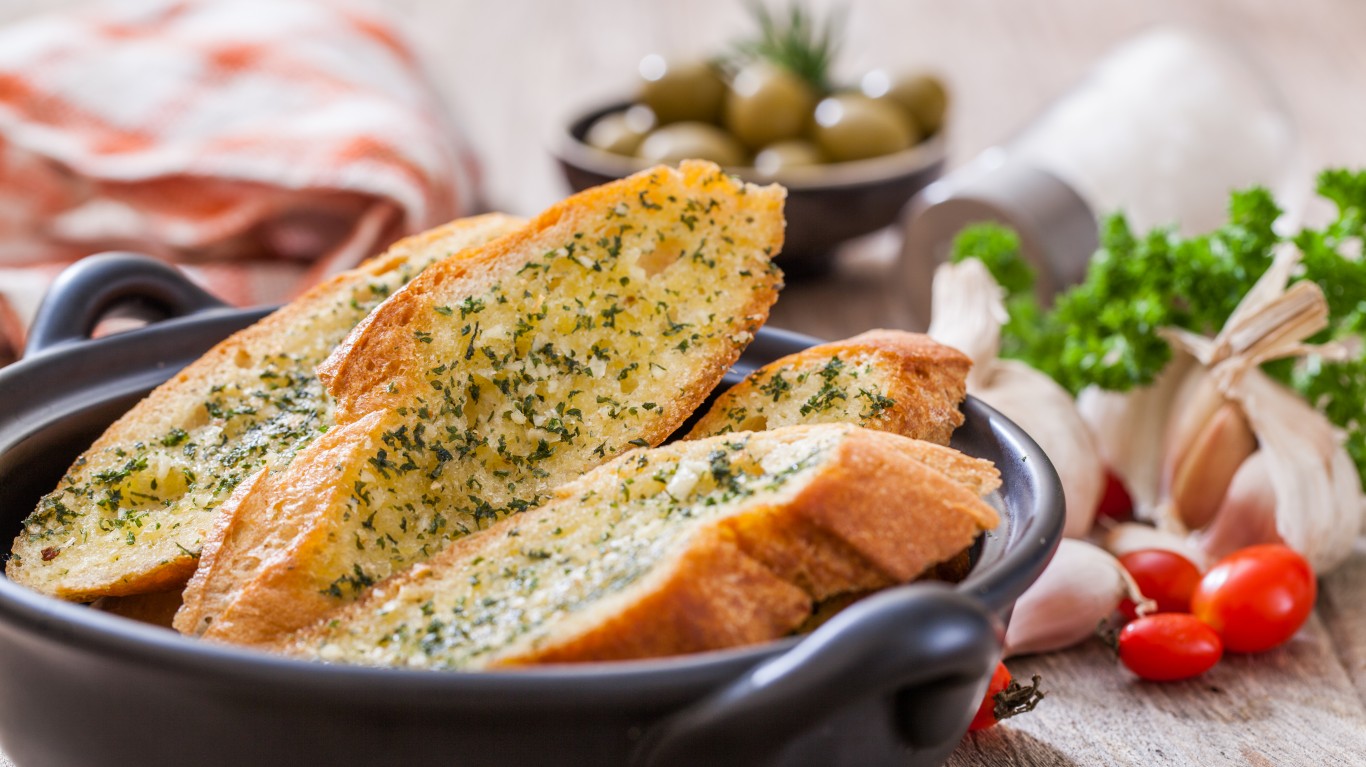
Better than garlic bread (directions)
Preheat oven to 250 degrees F.
Using a bread knife, carefully cut bread in half lengthwise.
Mix garlic powder, thyme, basil, oregano, onion flakes, parsley, and chives into softened butter thoroughly with a wooden spoon, then spread mixture on both cut sides of bread and reassemble loaf.
Wrap bread loosely in foil, place on a baking sheet, and bake for 30 minutes. Let bread cool slightly before cutting into vertical slices.
[in-text-ad]
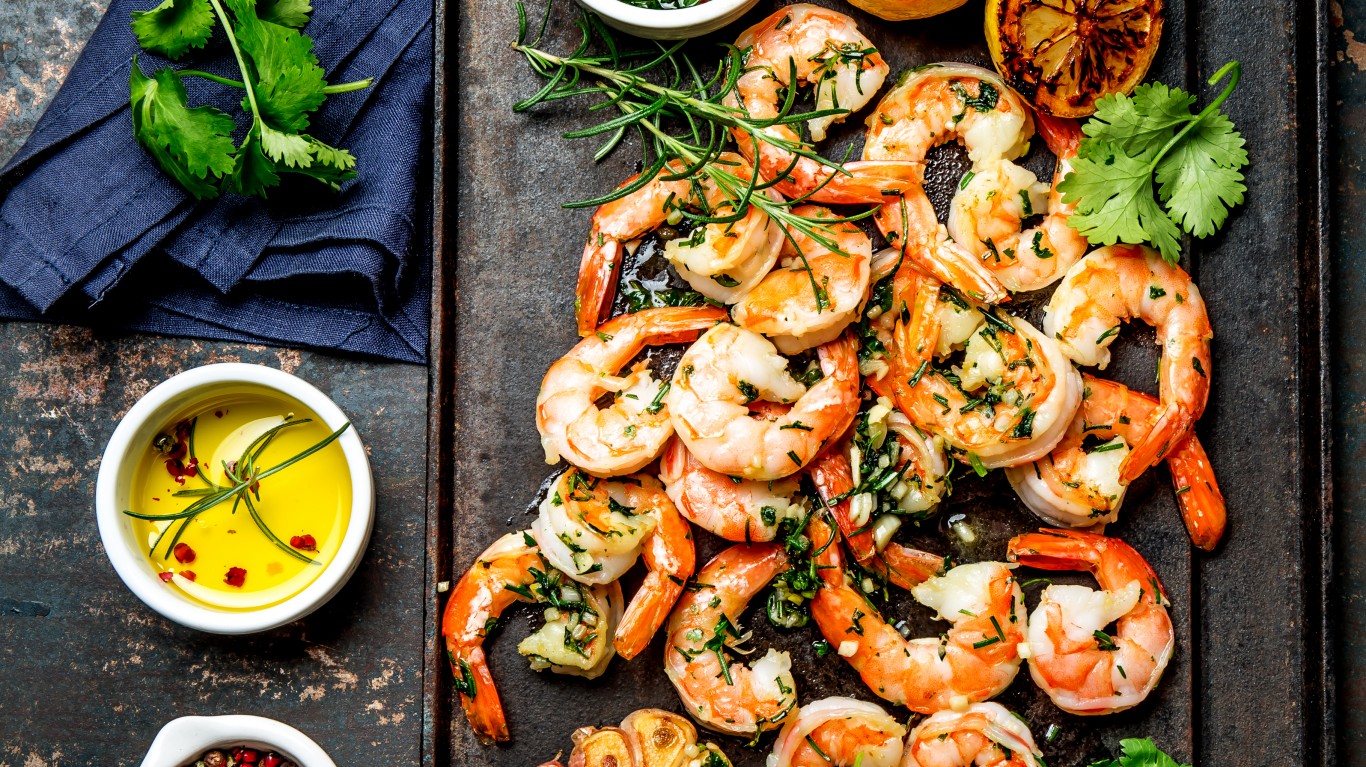
Herb and garlic shrimp (ingredients)
While pre-cooked shrimp, already shelled and deveined, works perfectly well for this dish, it’s even better if you can find fresh raw shrimp and have the patience to peel and devein them yourself. If using raw shrimp, cook for 1-2 minutes longer than directed.
1 stick butter, melted
1 tablespoon olive oil
3 cloves garlic, peeled and finely chopped
1/4 cup mixed fresh herbs (e.g., parsley, basil, tarragon, thyme, oregano, marjoram, summer savory)
Juice of 1/2 lemon
Salt
40 medium cooked, shelled, and deveined shrimp
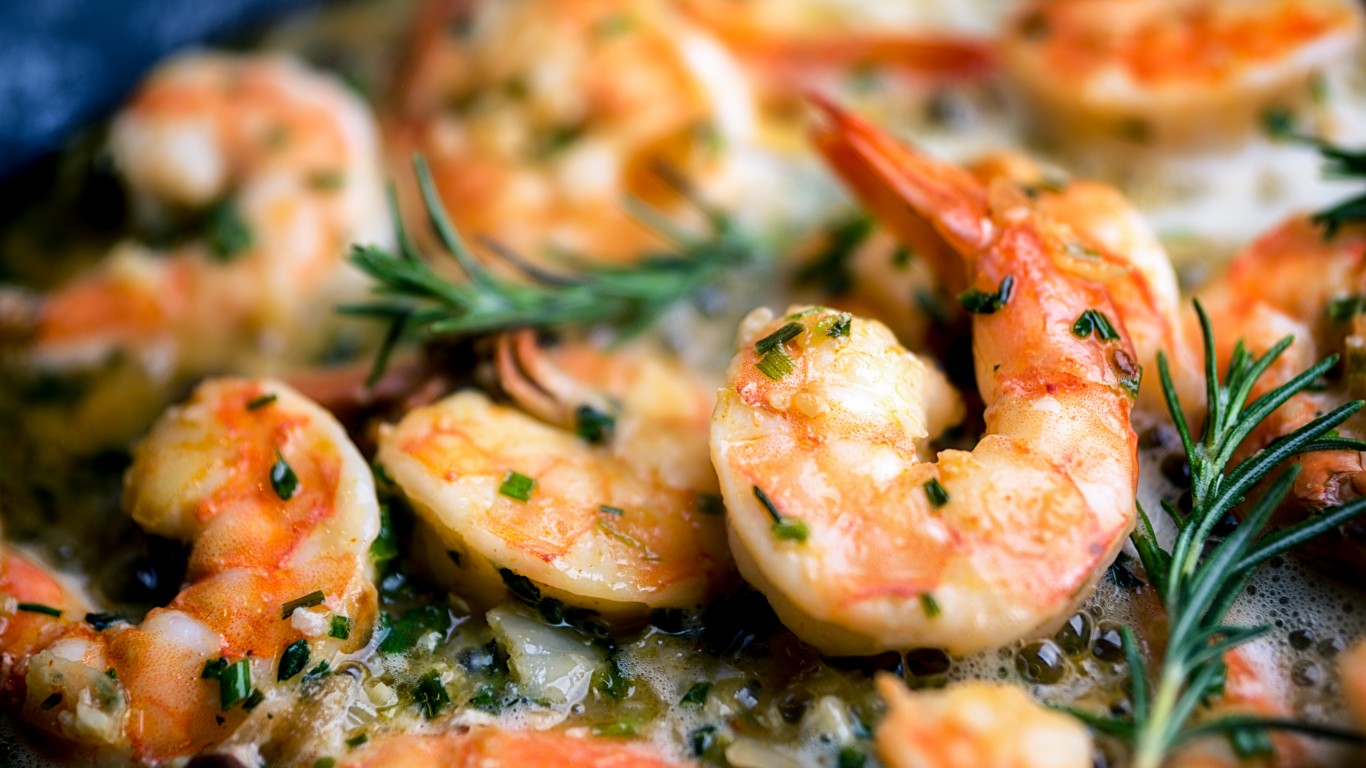
Herb and garlic shrimp (directions)
Combine butter and olive oil in a large skillet over medium heat. Add the garlic and cook, stirring frequently, for 4-5 minutes or until garlic is soft and fragrant. Stir in herbs, lemon juice, and plenty of salt, and cook for about 3 minutes more.
Raise the heat to high, add shrimp, and cook for 1-2 minutes or until shrimp are just heated through. Serve with rice or crusty bread if you like.
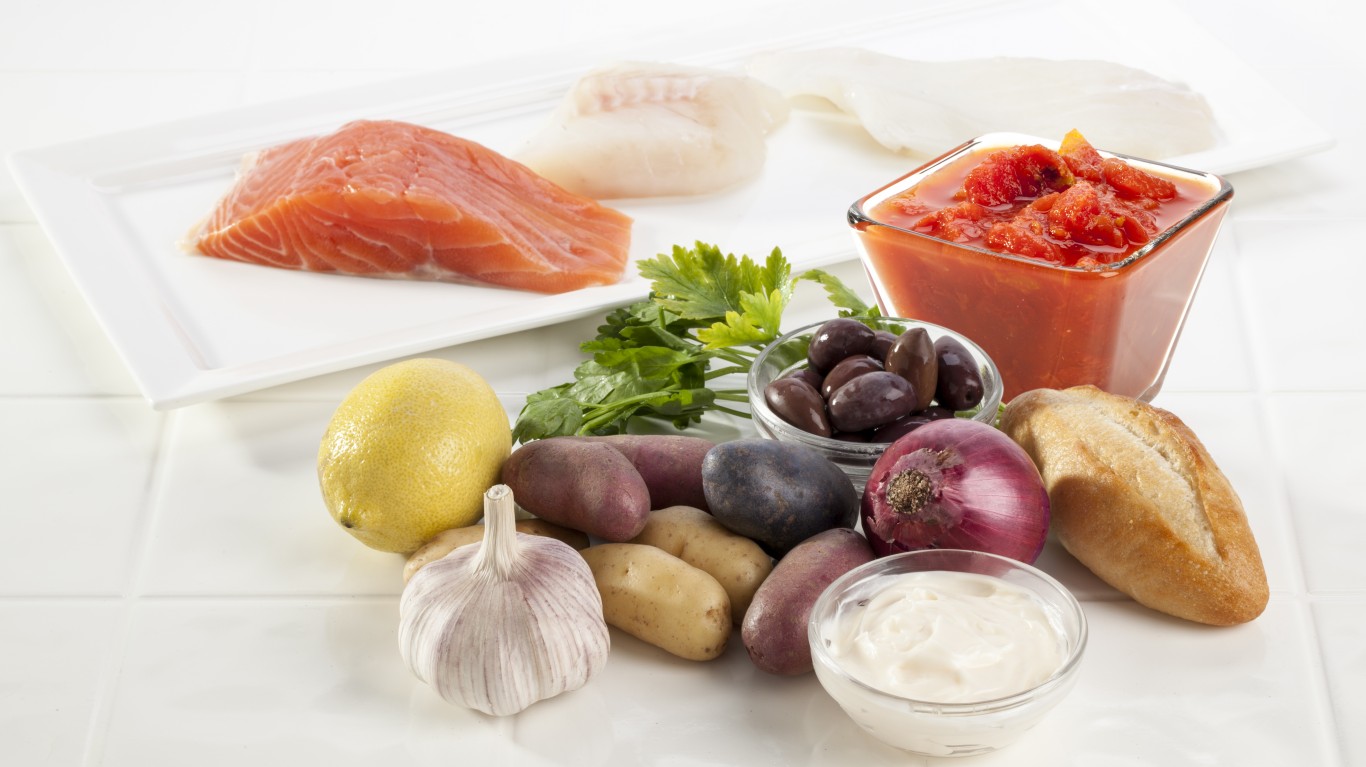
Provençal fish stew (ingredients)
Use a combination of fish in this dish, if you like. In addition to or instead of cod or sea bass, other good choices would be monkfish, halibut, red snapper, or grouper.
2 tbsp. extra-virgin olive oil
2 onions, peeled and finely chopped
1 stalk celery, finely chopped
2 cloves garlic, peeled and finely chopped
4 sprigs parsley, finely chopped
4 anchovy filets, chopped
4 large ripe tomatoes, peeled, seeded, and chopped
1/2 bottle dry white wine
1 1/2 lbs. cod or sea bass, cut into large chunks
Salt and pepper
[in-text-ad-2]
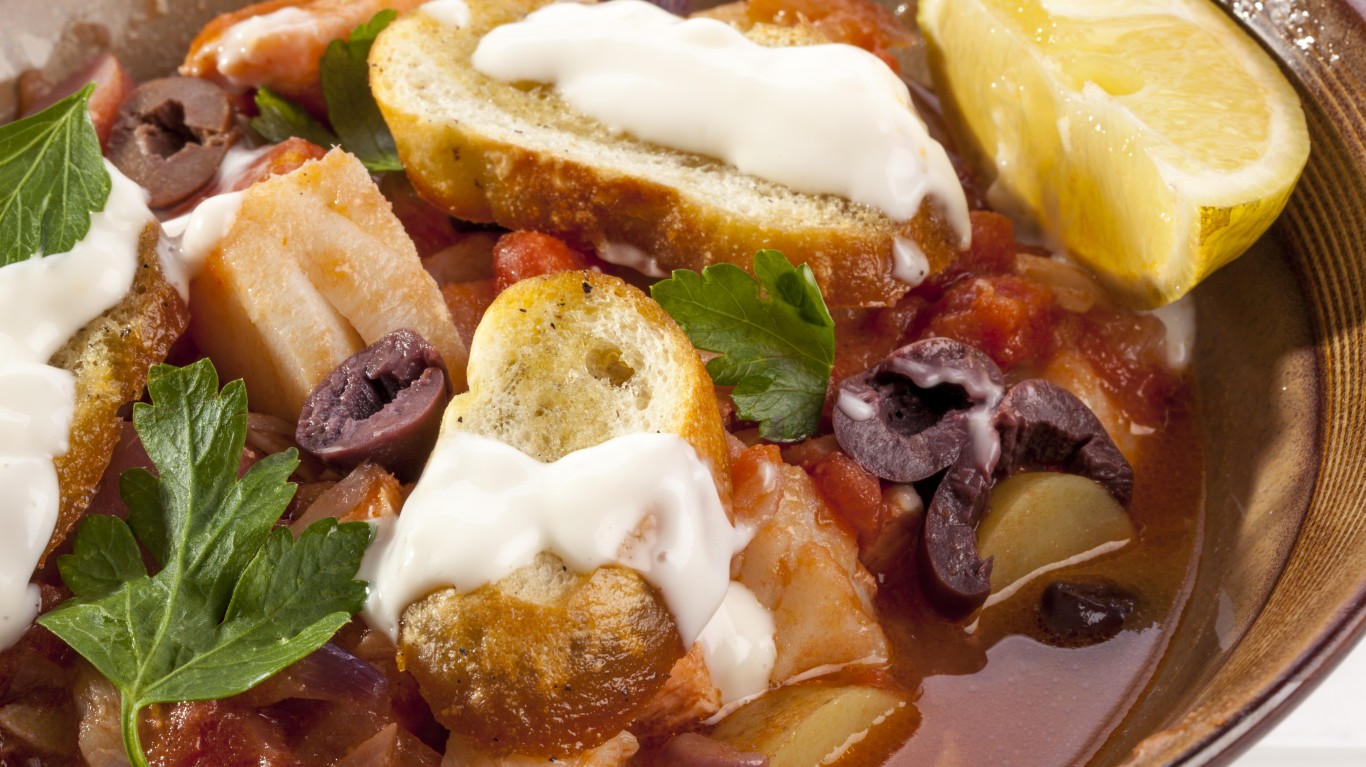
Provençal fish stew (directions)
Heat the olive oil over low heat in a Dutch oven or other heavy-bottom pot with a lid, then add onions, celery, garlic, and parsley. Cook, stirring occasionally, for about 15 minutes, or until onions are soft and translucent. Stir in anchovies and tomatoes and continue cooking about 10 minutes longer.
Add wine, turn heat to high, and cook, stirring constantly, for about 3 minutes. Reduce heat to low, add fish to pot, then add just enough water to cover the ingredients. Season to taste with salt and pepper, then turn heat to high again and bring stew to a boil.
Reduce heat to low again and cook, partially covered, for about 45 minutes. Serve with rice or crusty bread if you like.
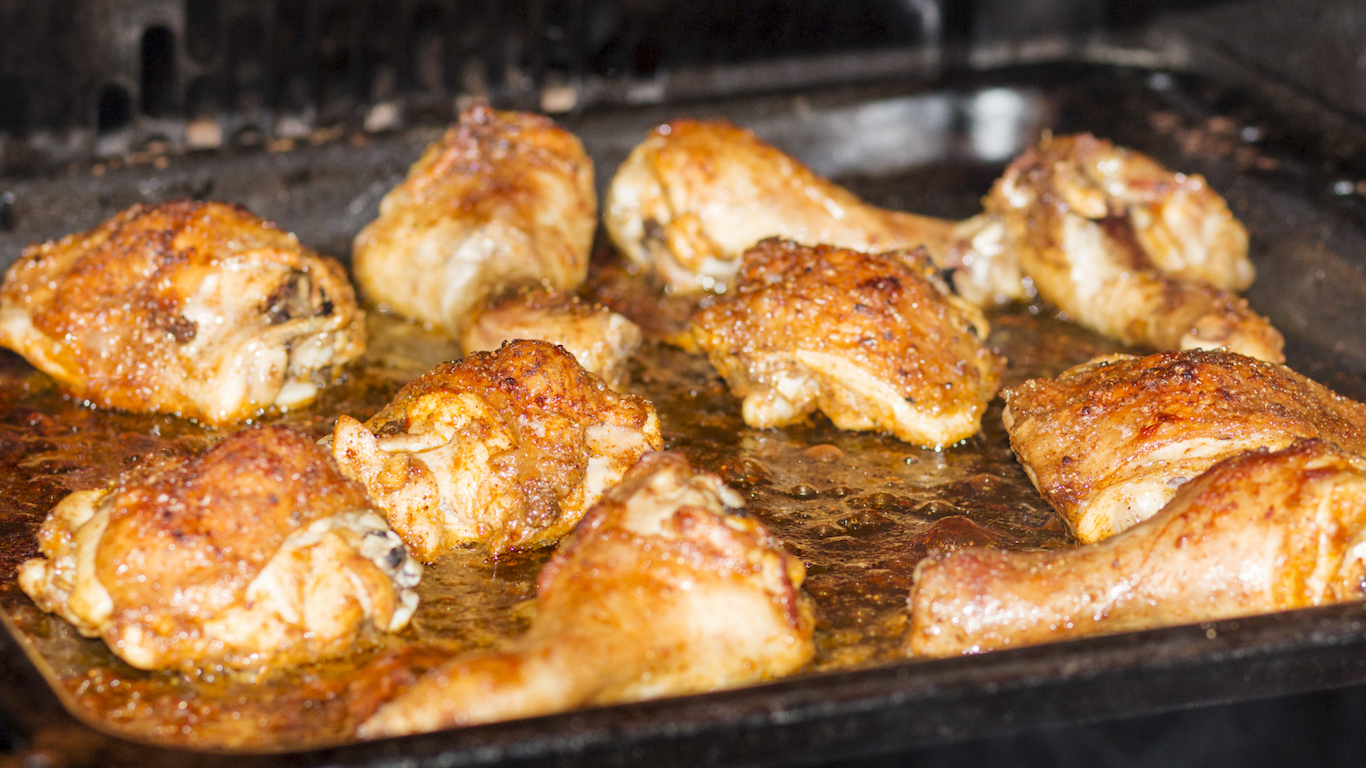
Mediterranean chicken thighs (ingredients)
Bone-in thighs with the skin still on stay juicier, but if you like, you may substitute boneless, skinless ones. If you do, bake them for 5-10 minutes less.
3 tbsp. extra-virgin olive oil
1/2 cup dry white wine
Juice of 1 lemon
1 tbsp. lemon zest
Salt and pepper
2 cloves garlic, peeled and finely chopped
1/2 tsp. dried rosemary
8 chicken thighs, bone-in, with skin on
[in-text-ad]
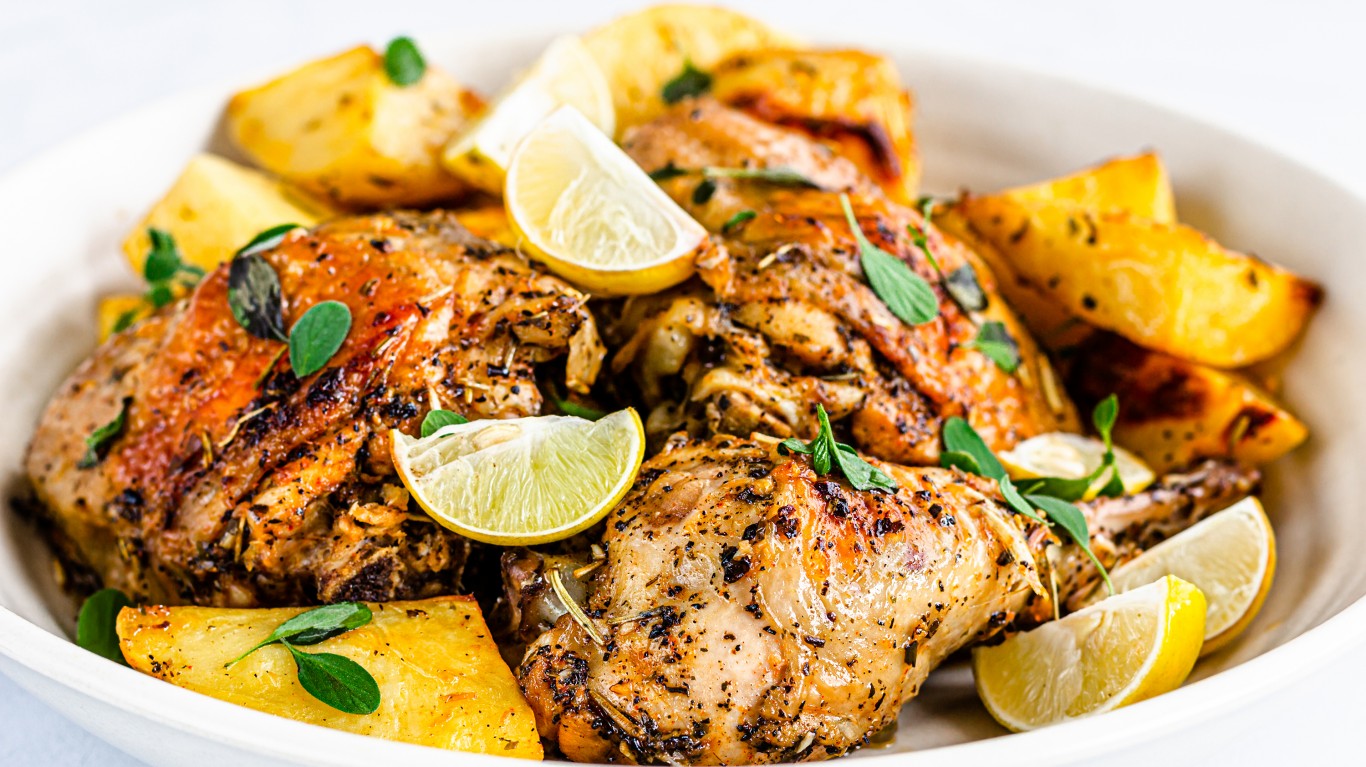
Mediterranean chicken thighs (directions)
The night before you plan to cook, combine 2 tbsp. olive oil with wine, lemon juice, lemon zest, plenty of salt and pepper, garlic, and rosemary in a large bowl, then add the chicken thighs and toss them with tongs or a wooden spoon so that marinade covers all surfaces. Cover bowl with plastic wrap and refrigerate overnight or for at least 8 hours, tossing several times.
To cook, preheat oven to 375 degrees F.
Grease a baking pan with remaining olive oil and lay the chicken thighs in it side by side. Bake for 25-30 minutes or until chicken is cooked through (15-20 minutes if using boneless, skinless thighs), turning once. Adjust seasoning if necessary. Serve with rice, roast potatoes, or green salad.
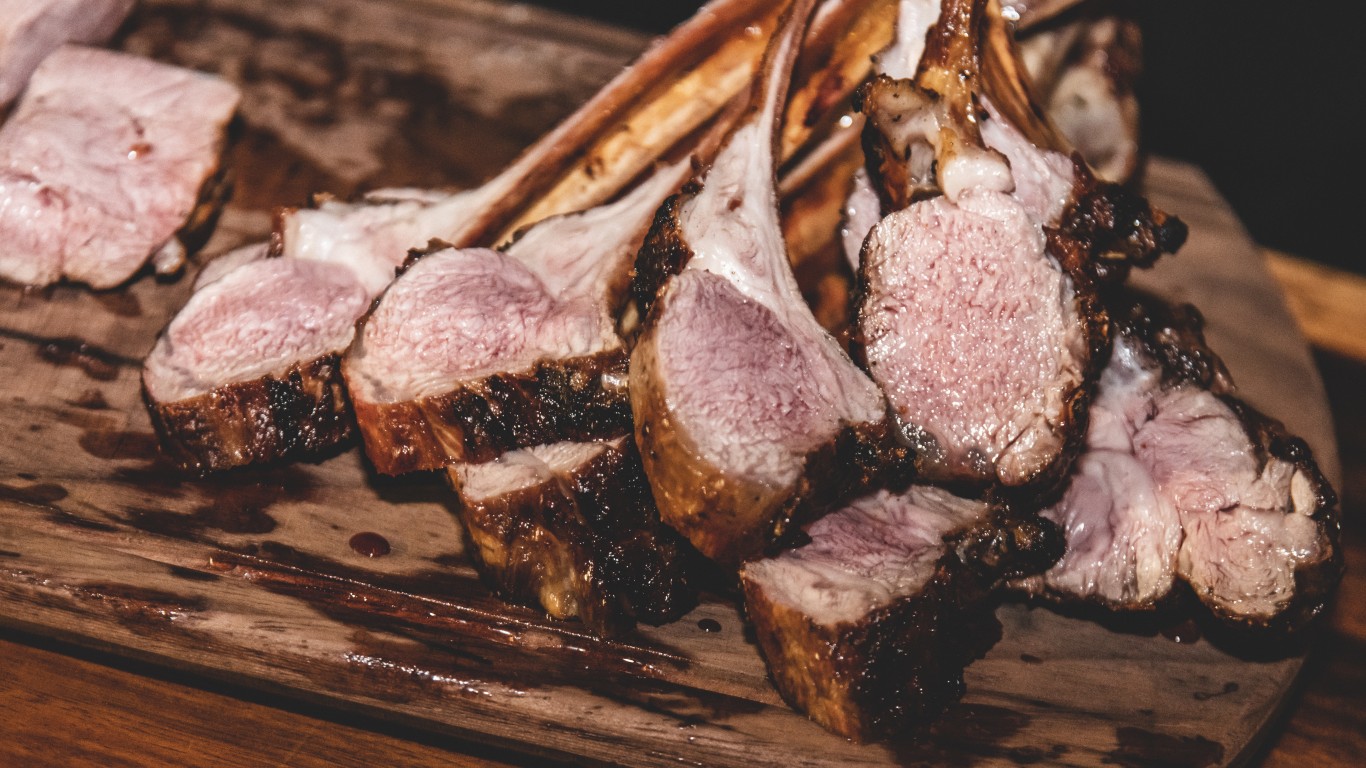
Greek lamb chops baked in foil (ingredients)
1 tbsp. extra-virgin olive oil
4 6- to 8-ounce shoulder lamb chops
Salt and pepper
4 cloves garlic, peeled and thinly sliced
1 small zucchini, thinly sliced
1 tsp. dried oregano
4 bay leaves
4 slices feta cheese, about 2″ x 3″ and 1/3 inch thick
4 large celery leaves
Juice of 1 lemon
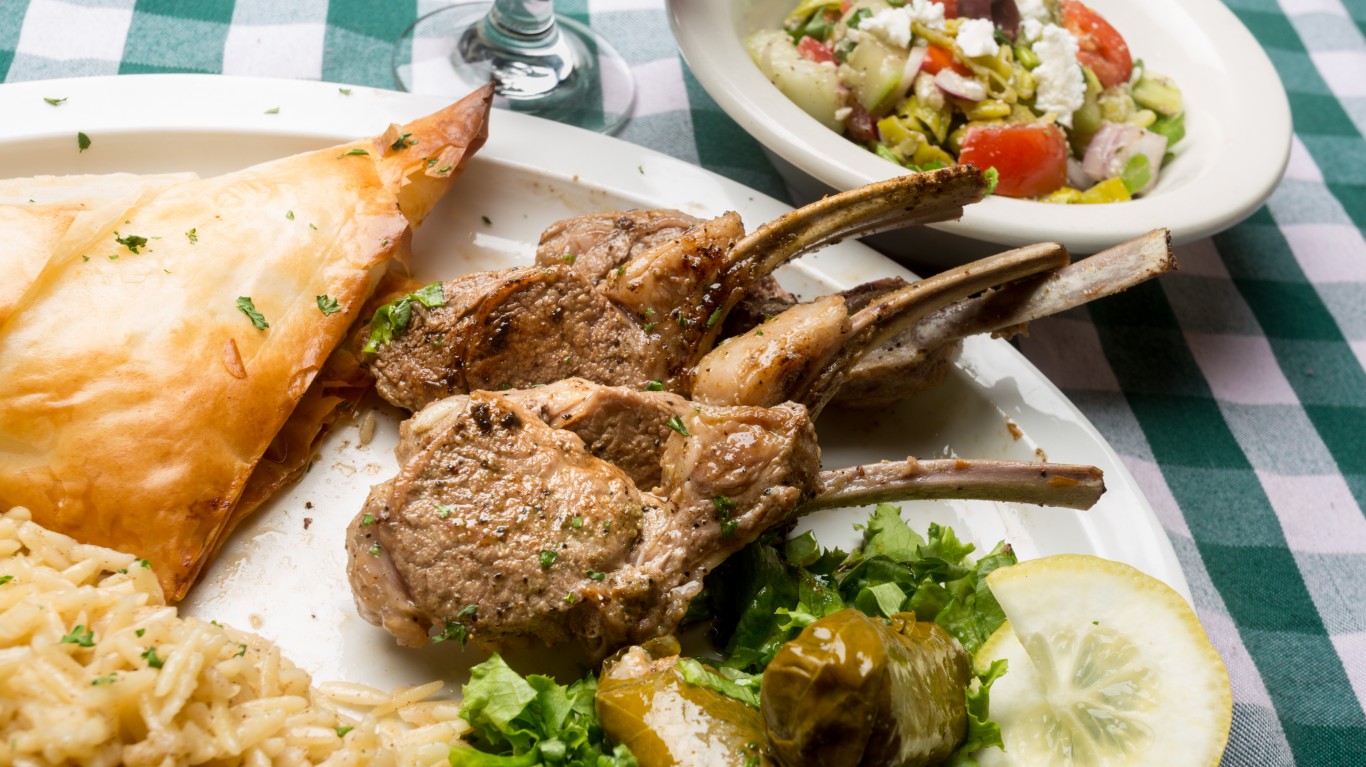
Greek lamb chops baked in foil (directions)
A variation on the cooking method called en papillote, meaning cooked in a wrapping of parchment paper, cooking lamb wrapped in foil with vegetables and aromatics leaves it juicy, tender, and full of flavor.
Preheat oven to 350 degrees F.
Lay 4 sheets of aluminum foil, about 12″ x 12″, on a flat surface and brush them on 1 side with olive oil.
Place 1 lamb chop in the middle of each sheet and season generously with salt and pepper. Distribute garlic slices evenly between the 4 chops, top with a layer of zucchini slices, and sprinkle oregano evenly over them. Place 1 bay leaf, 1 slice of feta, and 1 celery leaf, in that order, on top of each chop. Sprinkle the lemon juice evenly over the tops of each chop.
Fold each aluminum sheet into a packet around the lamb, leaving a little room at the top, and crimp the packets tightly shut. Place packets side by side on a baking sheet and bake for 1 hour.
To serve, carefully cut open packets, being careful of escaping steam, and slide the lamb with its toppings onto plates, discarding bay leaves. Serve with rice or green salad, if you like.
[in-text-ad-2]
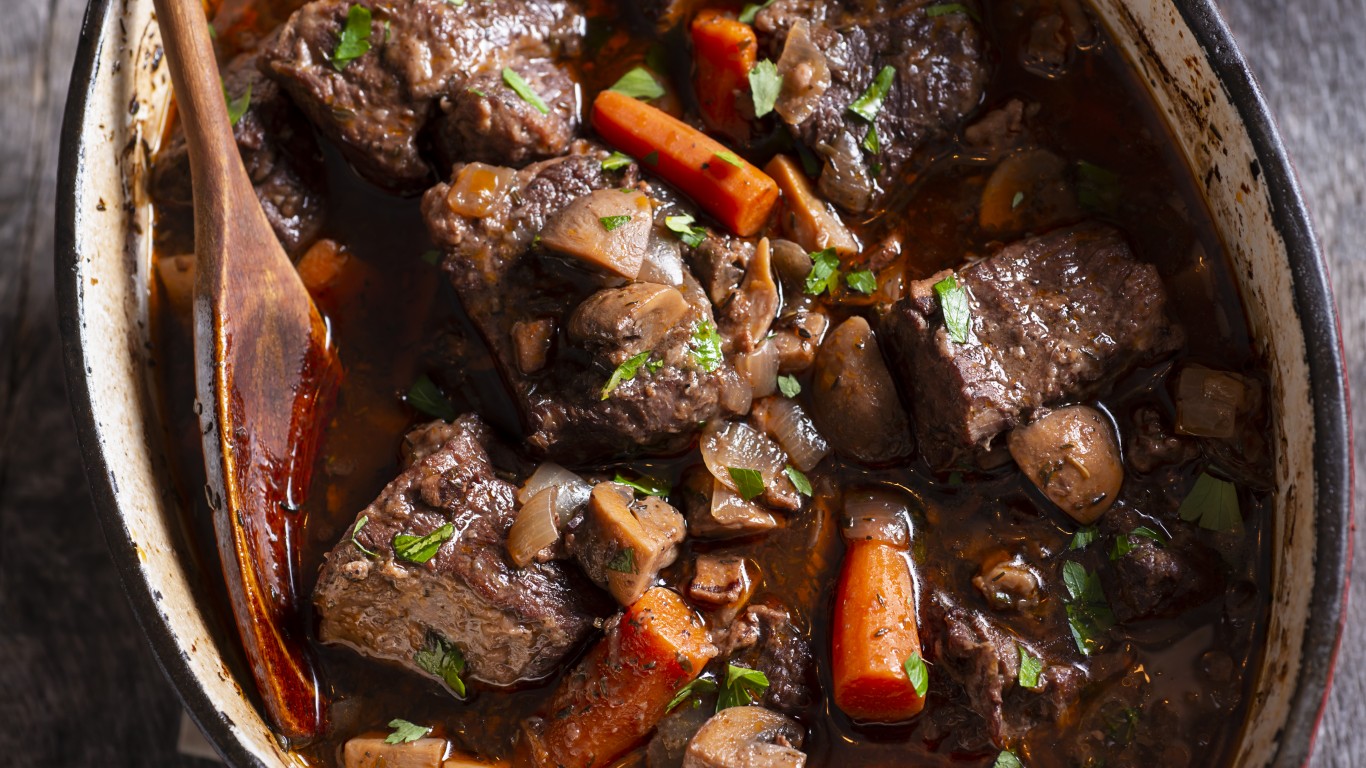
Red wine beef stew (ingredients)
The wine helps produce a rich, dark gravy for this stew — but the results are family-friendly because long cooking burns off all the alcohol. For extra flavor, save the bacon grease the next time you cook bacon and substitute it for all or part of the butter and olive oil.
1½- 2 lbs. boneless beef stew meat
Salt and pepper
2 tbsp. butter
1 tbsp. extra-virgin olive oil
1 medium onion, peeled and chopped
1 carrot, peeled and chopped
3-4 white mushrooms, chopped
1 bottle dry red wine
1 bay leaf
3 tbsp. tomato paste
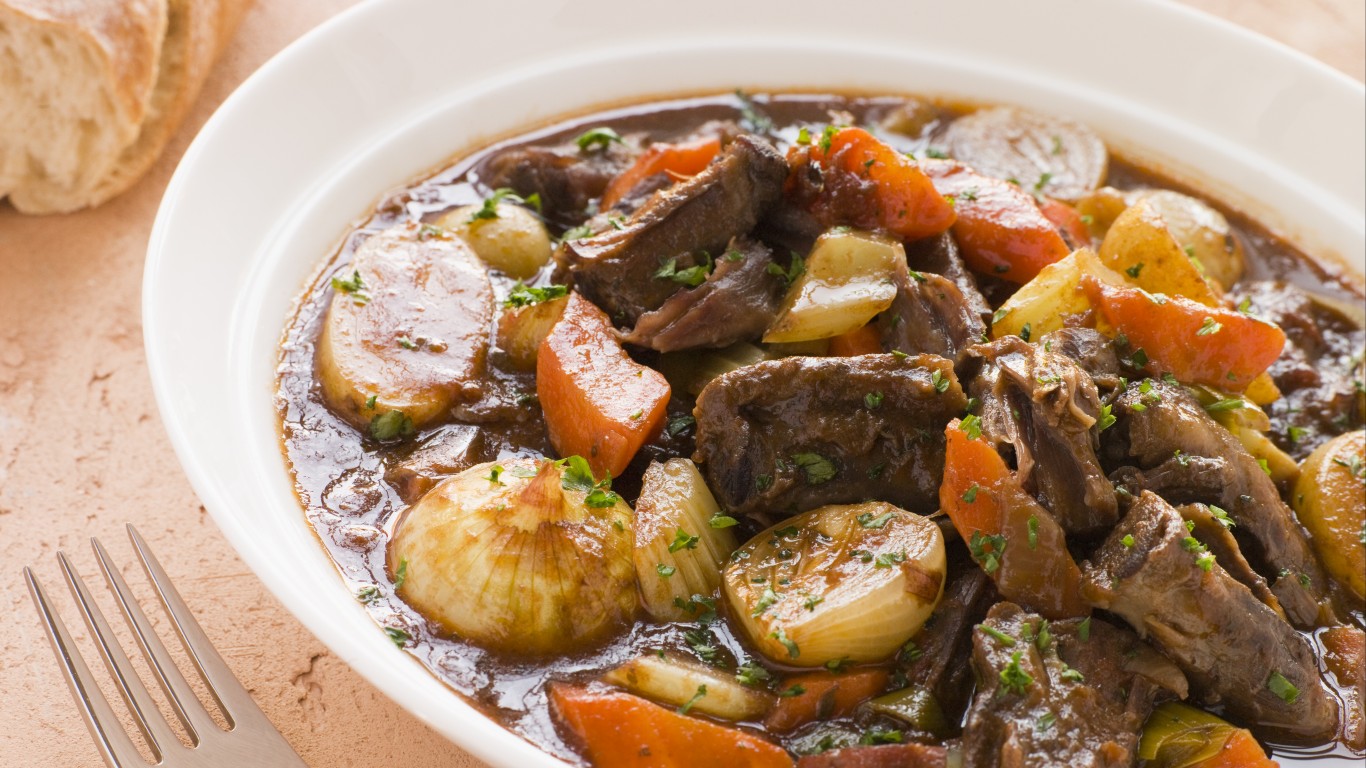
Red wine beef stew (directions)
Preheat broiler.
Put stew meat in a single layer in a large oven-proof skillet or roasting pan and season it generously with salt and pepper. Broil, turning pieces once, for about 20 minutes, or until browned on both sides.
Meanwhile, melt butter with olive oil over medium heat in a Dutch oven or heavy-bottom pot with a lid, then add onion, carrot, and mushrooms. Cover pot, increase heat to medium-high, and cook, stirring occasionally, while meat browns.
Add browned meat to pot along with any pan juices, then add wine and bay leaf. Increase heat to high and bring wine to a boil, then stir once and reduce heat to low. Simmer, covered, for 2 1/2 hours. Uncover, stir in tomato paste, and continue cooking for 1/2 hour longer. Serve with rice, buttered noodles, or crusty bread, if you like.
[in-text-ad]
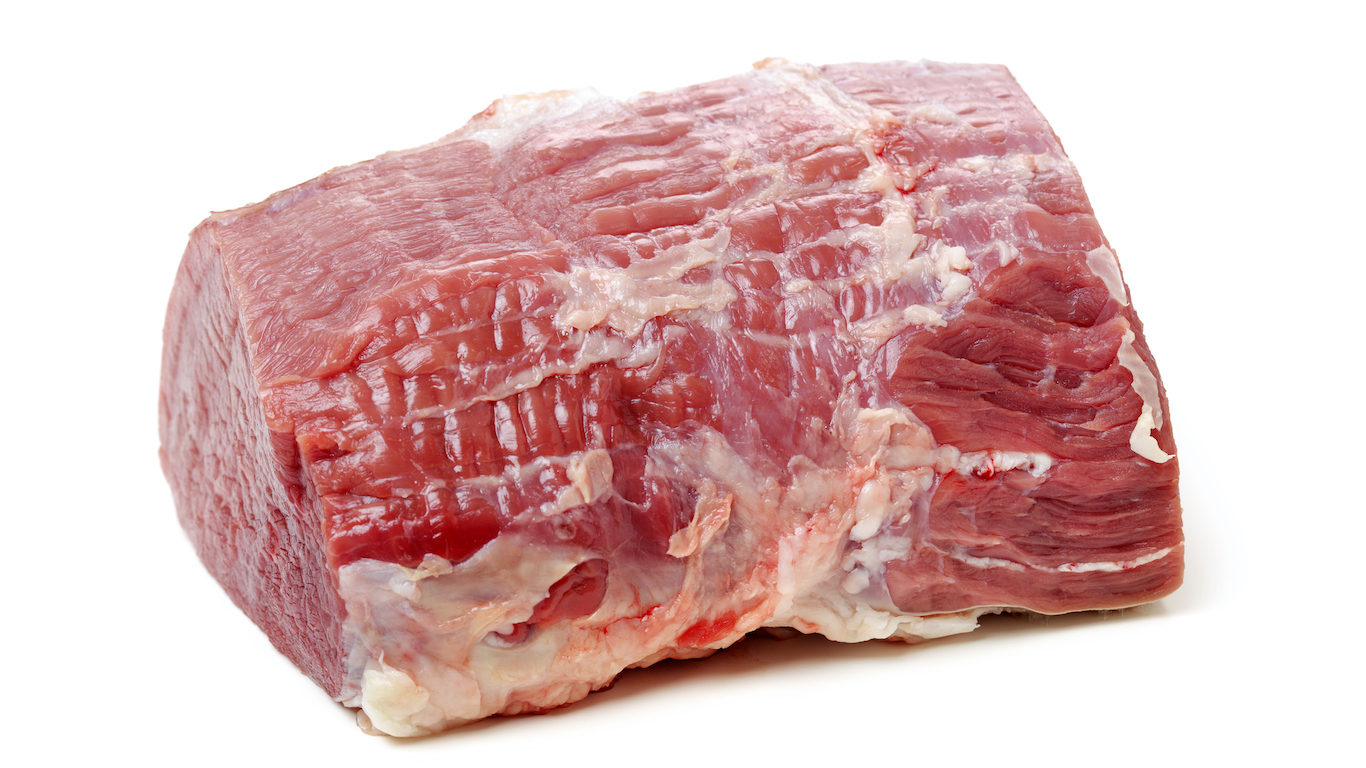
“Barbecued” pork (ingredients)
True barbecued meat is smoked long and slow over indirect heat, sometimes covered in a spice rub, sometimes seasoned with just salt and pepper. This indoor recipe, using the oven instead of a smoker or grill, lacks the same smoky character, but still captures real barbecue flavors.
1 tsp. powdered mustard
1 tbsp. salt
1 tbsp. pepper
1 tbsp. dark brown sugar
1 tbsp. cumin
1 tbsp. cayenne pepper
2 tbsp. sweet paprika or sweet Spanish smoked pimentón
1 6- to 8-lb. pork butt (also called Boston butt)
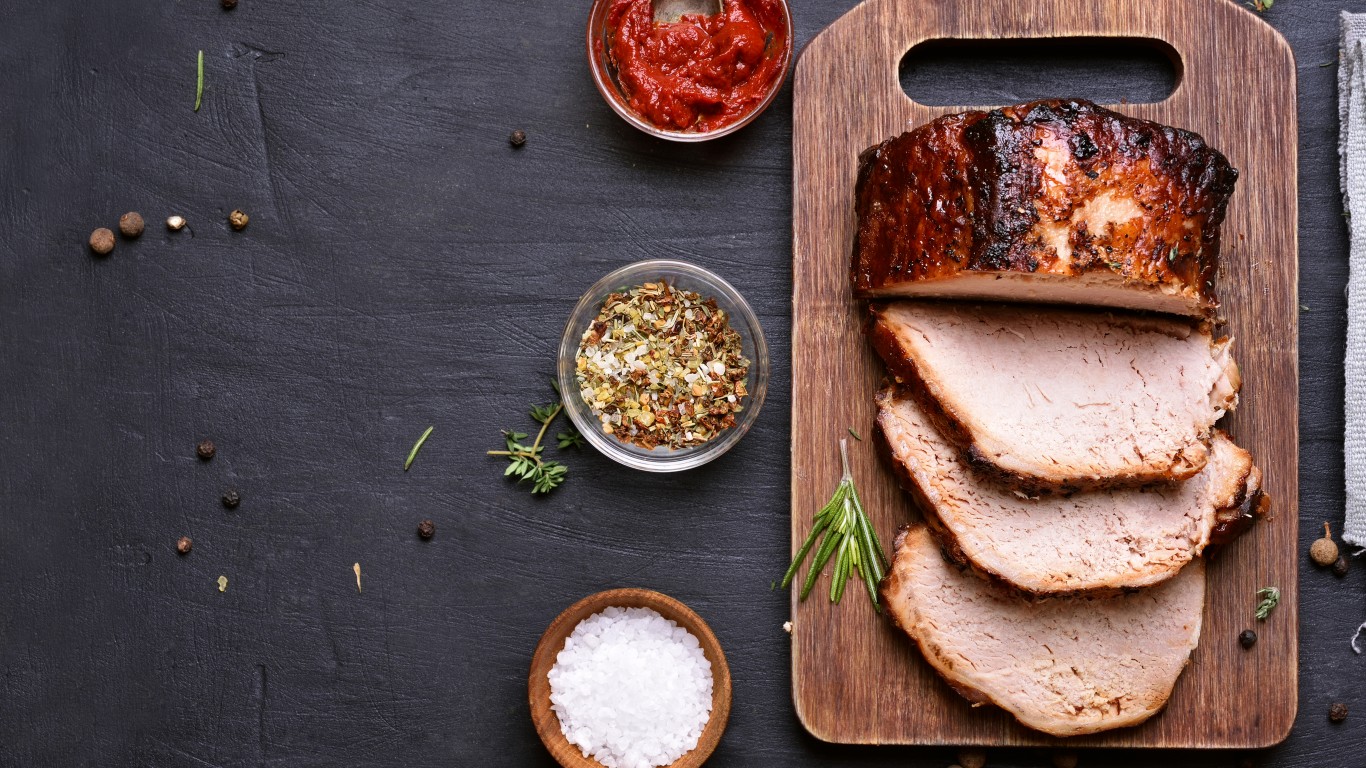
“Barbecued” pork (directions)
The night before you plan to cook, combine mustard, salt, pepper, brown sugar, cumin, cayenne pepper, and paprika in a bowl and mix together well. With your hands, coat pork butt with spice mixture, making sure to cover all surfaces, and pressing mixture into the meat. (Be sure to wash your hands thoroughly before and after the process.) Wrap meat in plastic wrap, set it on a plate large enough to hold it, and refrigerate overnight or for at least 8 hours.
To cook, preheat oven to 225 degrees F.
Unwrap the meat and put it, fat side up, into a roasting pan, preferably on a wire rack, and roast it, uncovered, for 5 to 7 hours, or until the exterior forms a dark, crisp “bark” (as it’s known in the barbecue world) and the internal temperature, measured with a meat thermometer, reaches 200 degrees F.
Let the meat sit for about 30 minutes, then slice it or shred it with two forks. Add your favorite barbecue sauce, if you like. Serve in sandwiches or tacos, or alongside “white beans Italian style” (see below) or some other bean dish. This recipe makes considerably more than 4 servings (it will serve 8 to 12, depending on use), but the meat will keep in the refrigerator for up to a week, and may be frozen if necessary.
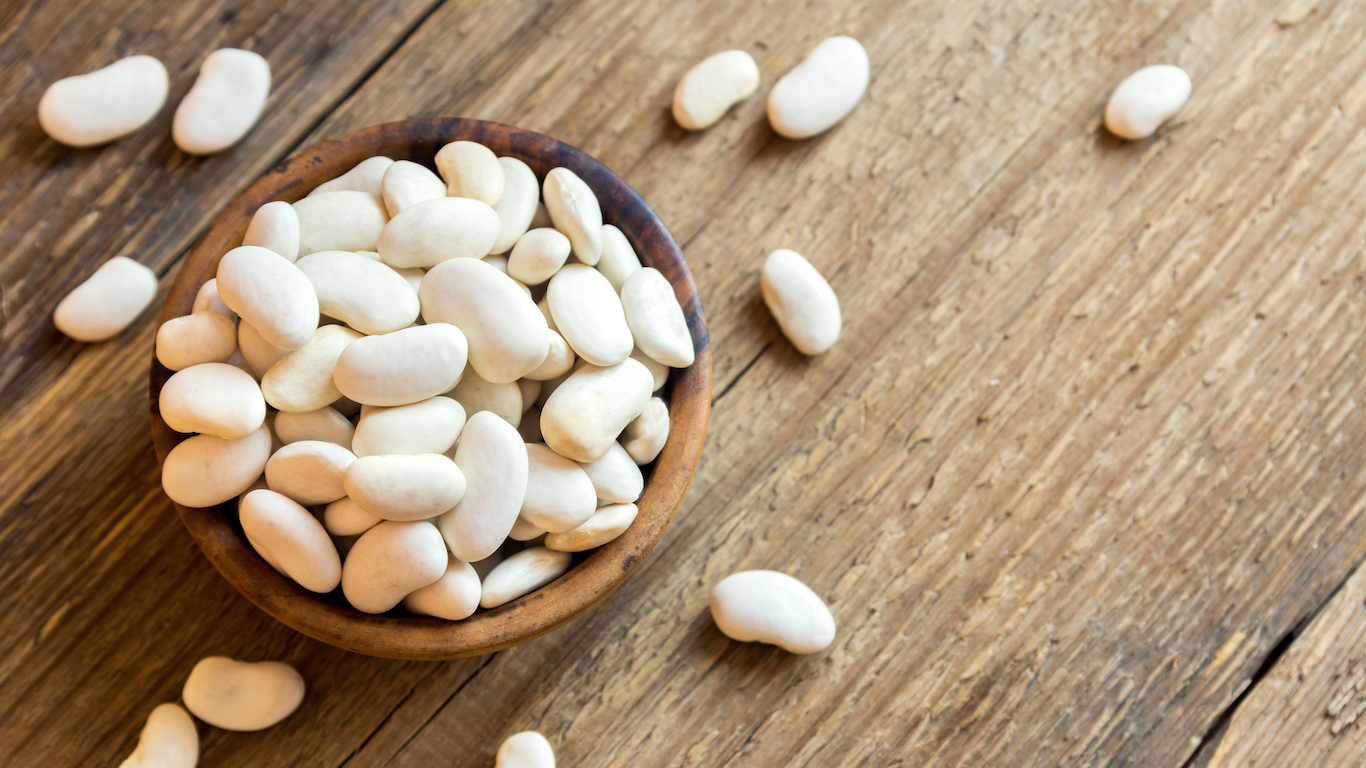
White beans Italian style (ingredients)
Plump white cannellini beans are common in Italy, but this recipe works well with other varieties, too, including black beans, kidney beans, and garbanzos.
3 tbsp. butter
1 tbsp. extra-virgin olive oil
1/2 lb. mild Italian sausage, slipped out of its casings and chopped
1 4-oz. package cubed pancetta (Italian bacon; sold in deli cases and Italian markets)
1 onion, peeled and finely chopped
1 stalk celery, finely chopped
2 cloves garlic, peeled and finely chopped
3 sprigs rosemary
Pinch of nutmeg
Salt and pepper
3 15.5-oz. cans cannellini beans
[in-text-ad-2]
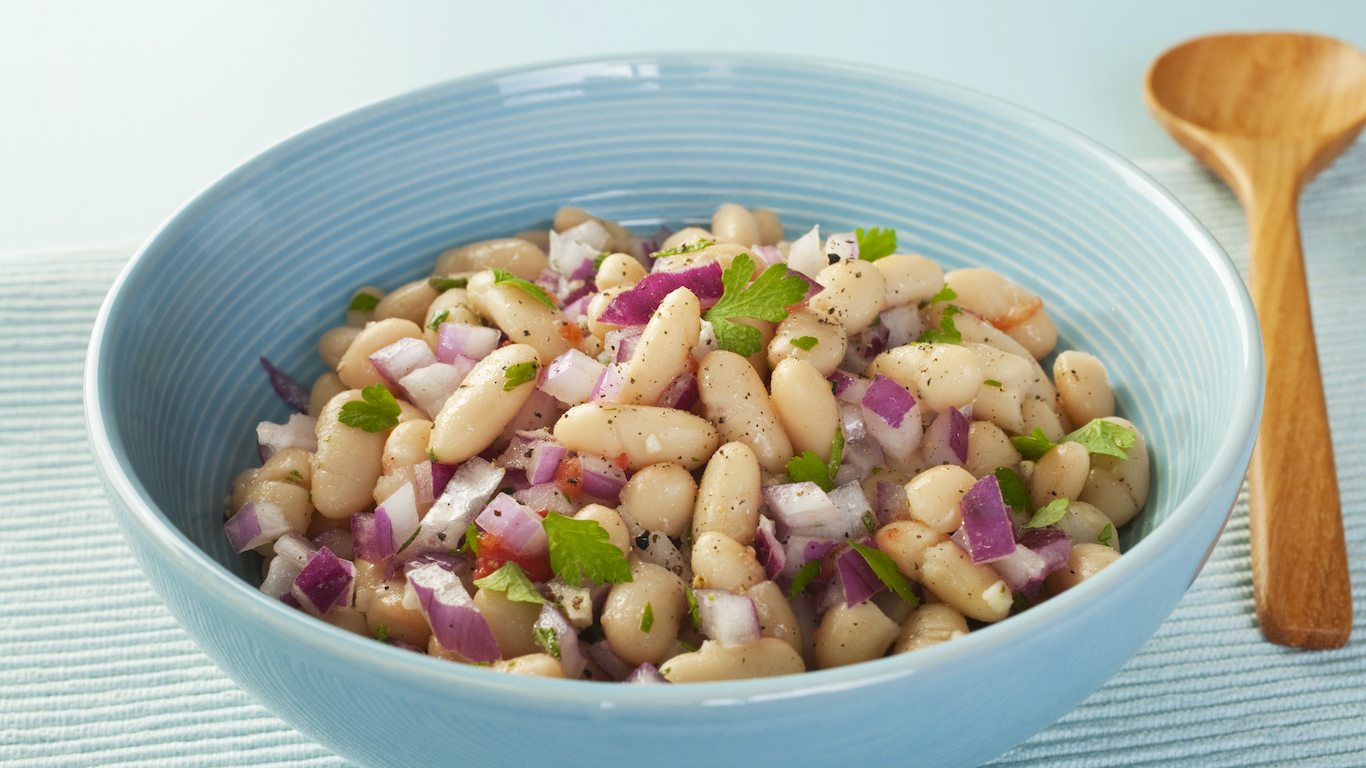
White beans Italian style (directions)
Melt butter with olive oil over medium heat in a Dutch oven or heavy-bottom pot, then add the sausage, pancetta, onion, celery, garlic, rosemary, nutmeg, and salt and pepper to taste.
Cook, stirring occasionally, for about 15 minutes, or until onions are soft and translucent and sausage and pancetta are slightly browned.
Drain beans, then add to the pot. Stir once, then cook for 2-3 minutes or until beans are heated through. Adjust seasoning if necessary. Serve as a side dish with “barbecue” pork (see above) or other meat, or as a main course accompanied by salad and crusty bread or “better than garlic bread” (see above).
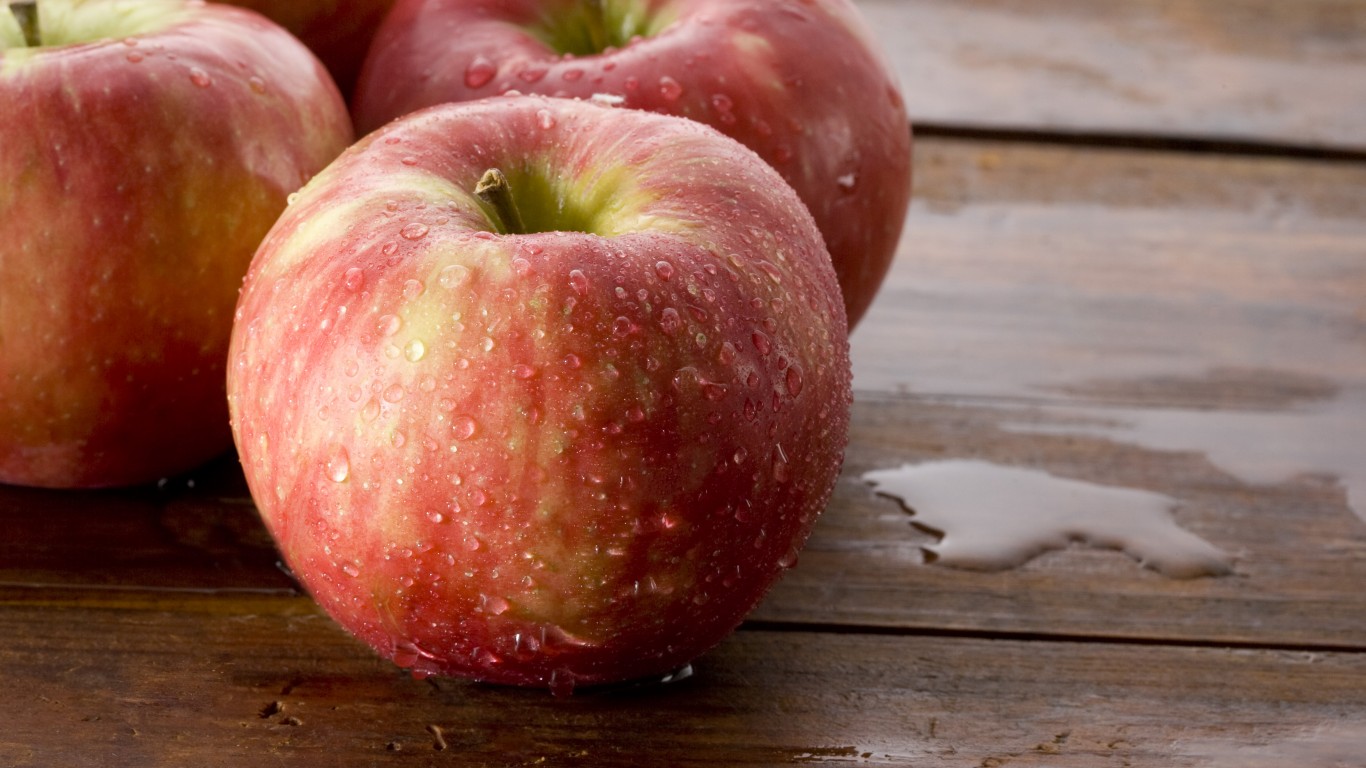
Honey-baked apples (ingredients)
This simple, old-fashioned treat makes an easy and satisfying dessert, but may also be served as an alternative to cereal at breakfast time.
4 large Granny Smith or Honeycrisp apples
4 tbsp. butter
2 tbsp. honey
1 tbsp. ground cinnamon
1 tbsp. ground nutmeg
1 tbsp. salt
[in-text-ad]
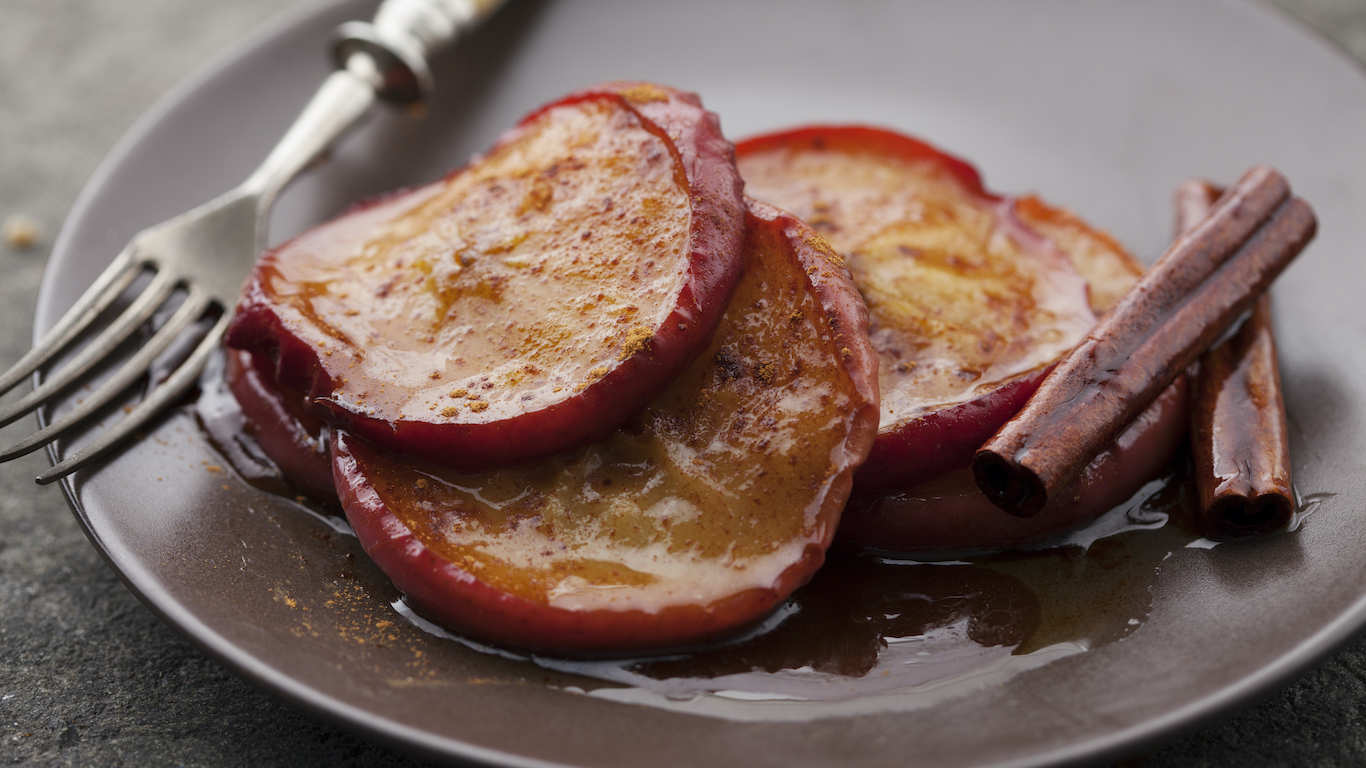
Honey-baked apples (directions)
Preheat oven to 350 degrees F.
Use an apple corer to core out each apple, being careful to leave at least 1/2 inch of base intact, then use a sharp spoon or melon baller to enlarge opening to about 2 inches.
Put 1 tbsp. of butter into each cavity, then drizzle honey in, dividing it evenly between the apples. Combine cinnamon, nutmeg, and salt, and sprinkle mixture into each cavity and onto the rims of the apples, dividing it evenly between them.
Place apples into a baking dish just big enough to hold them side by side. Pour enough water into the dish to come up to about an inch, then bake apples for 45 minutes to 1 hour, or until they are very soft. Add more water if baking dish goes dry. Drizzle any liquid that remains when apples are cooked over the fruit.
Serve with heavy cream or a scoop of vanilla ice cream, if you like.
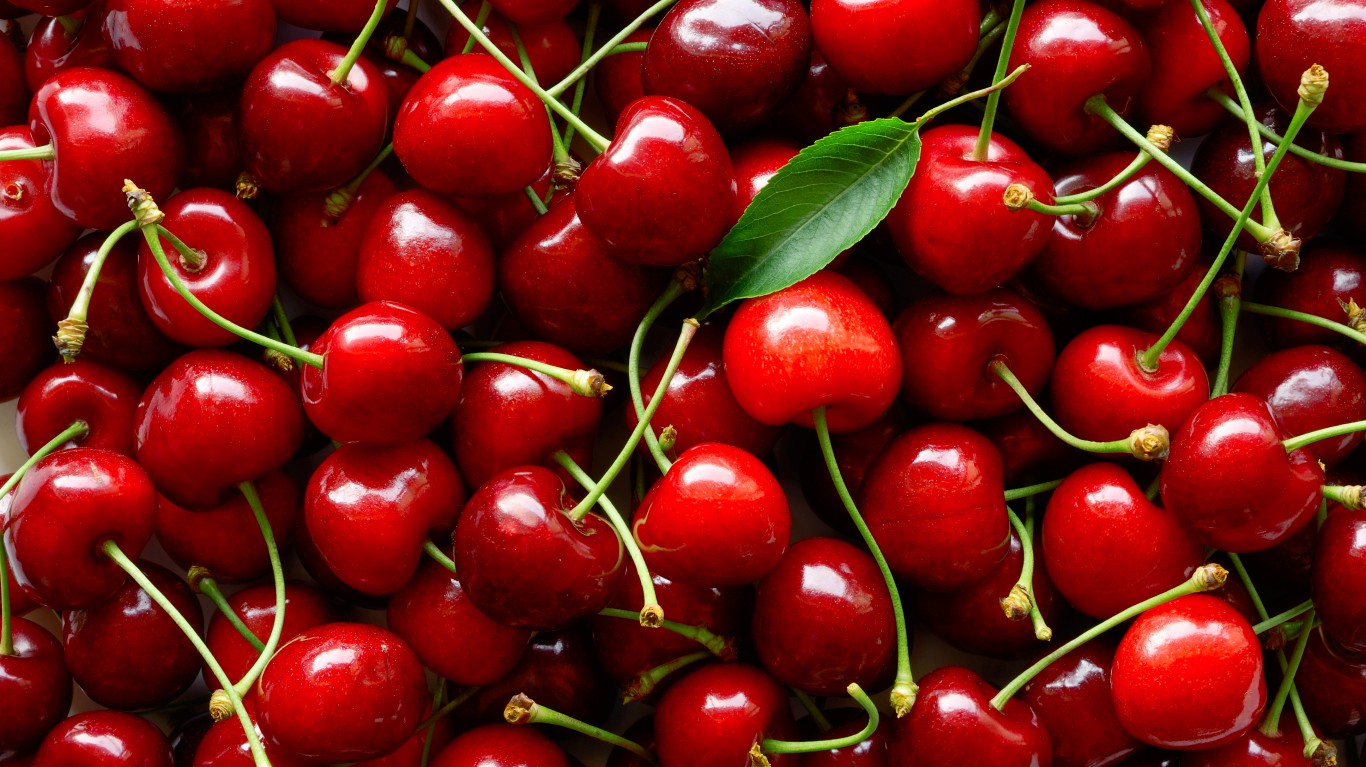
Cherry clafoutis (ingredients)
Clafoutis (“clah-foo-TEE”) is a French dessert that’s sort of a cross between a pudding, a cake, and a soufflé. It is traditionally made with cherries, though prunes, apples, and other fruits are sometimes used. This is a perfect dessert to make with the first spring cherries.
3 medium eggs
1 cup whole milk
1 tsp. vanilla extract
1/2 tsp. almond extract (optional)
2 tbsp. butter, melted, plus more for greasing pan
1/2 cup sugar
1/2 cup flour
1 cup pitted fresh or frozen (thawed) cherries
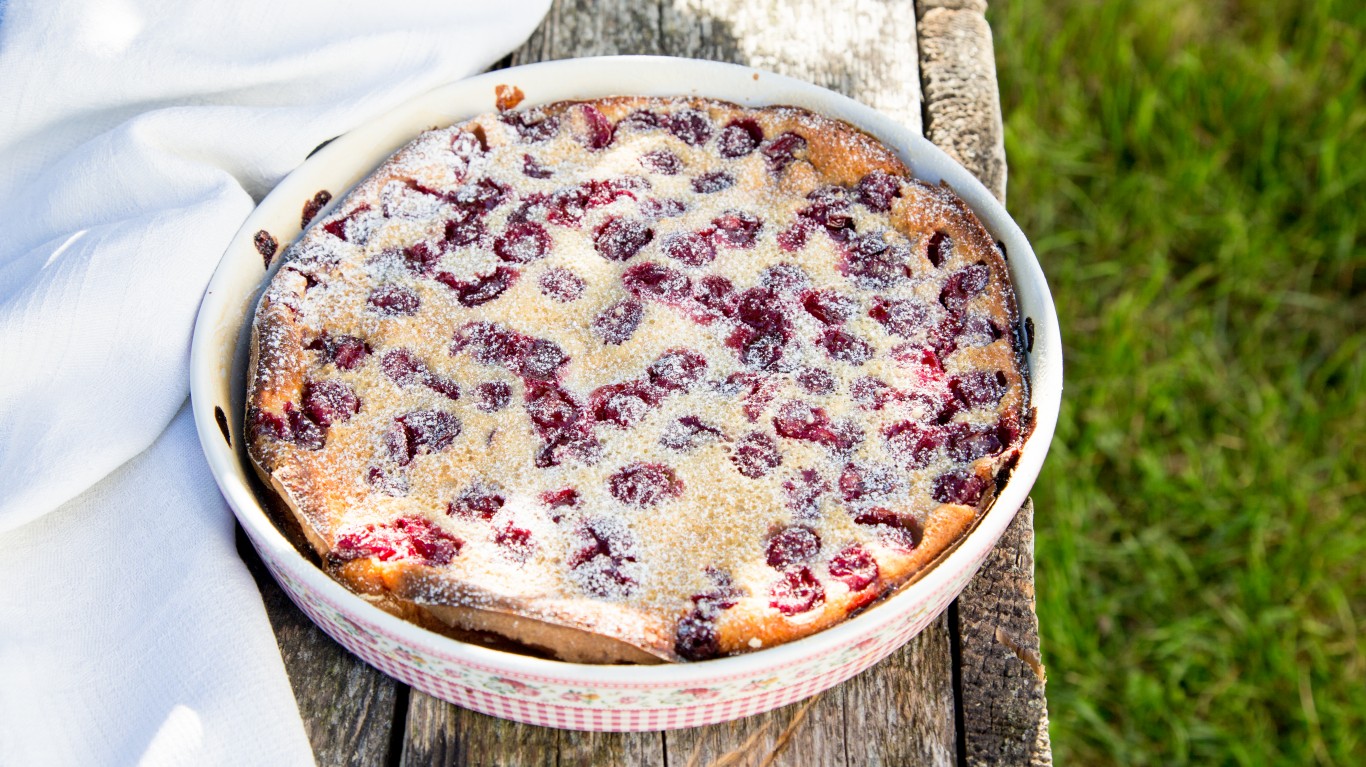
Cherry clafoutis (directions)
Preheat oven to 325 degrees F.
In a large bowl, whisk eggs lightly, then drizzle in milk, continuing to whisk. Add vanilla and (if using) almond extract, then whisk in melted butter. Pour in sugar in a slow stream, continuing to whisk, then do the same with flour. Whisk until smooth.
Lightly grease a 9-inch deep-dish pie pan or cast-iron skillet with butter, then pour in batter. Scatter cherries evenly over the top, letting them sink partway into the batter.
Bake for 40-45 minutes, or until clafoutis is golden-brown, and a toothpick inserted into the center comes out clean.
To serve, let cool slightly, then cut into wedges.
Want retirement to come a few years earlier than you’d planned? Or are you ready to retire now, but want an extra set of eyes on your finances?
Now you can speak with up to 3 financial experts in your area for FREE. By simply clicking here you can begin to match with financial professionals who can help you build your plan to retire early. And the best part? The first conversation with them is free.
Click here to match with up to 3 financial pros who would be excited to help you make financial decisions.
Thank you for reading! Have some feedback for us?
Contact the 24/7 Wall St. editorial team.